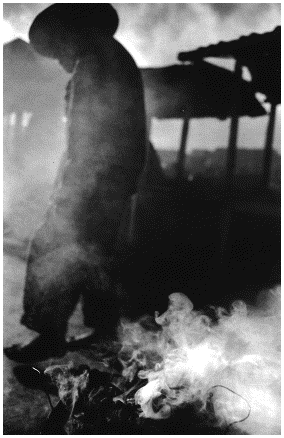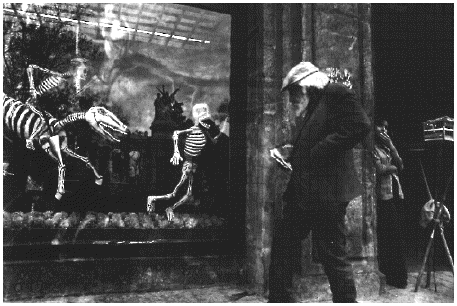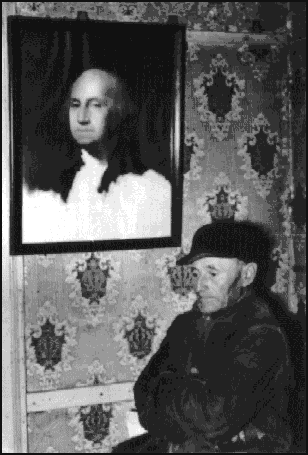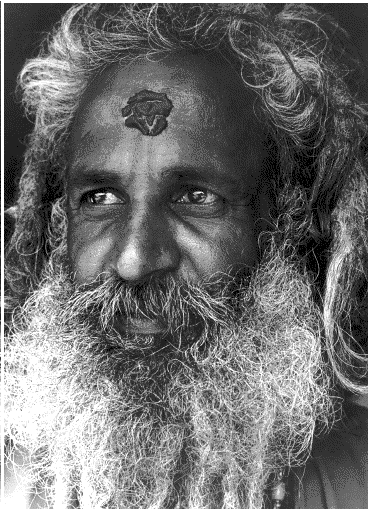Compassion
Finding Christ in the
Heart of the Poor
Gary Smith, S. J.
(Jesuit Way/Loyola)

- black eyes caused by physical abuse
- fury over not being able to access the system
- long-term alcoholism and its debilitating side effects
- murmuring, maddening voices in one's head, brought on by schizophrenia
- frustration with a body that will not function correctly
- malnutrition and its side-effects
- heroin withdrawal
- the weariness of old age
- fear of having to sleep on the streets.
- the need to talk
- the need to be held
- the need to weep
Radical Compassion tells of his daily interaction with some hundred souls who he seeks out when he knows they are at-risk --- or who seek him out. For instance, there's Dan.
He is "scruffy in appearance, mercurial, dreadfully serious, and defensive." He meets him at a bus stop. Smith had a suitcase, and Dan said, "Oh I see you are leaving us. Whatsamatter, don't have enough time for the poor anymore?"
I ask him why he was so angry. Wrong question. He spent the next ten minutes lambasting me for being "Mr. Psychologist" and for being indifferent to the homeless and the issues of the homeless. It was clear to him that I was a priest in the inner city for the sole purpose of pimping the poor, hiding behind my middle-class education and my mighty Jesuit graduate degrees.
Smith concludes, "I think I have learned over the years how to finesse the madness of the streets in all its many-headed forms. I rode him out, knowing that deep down he was hurting and saw in me something that he was not able to be anymore."
We get to follow Smith into the most pestiferous downtown areas of Portland, the SROs --- the single-room occupancy hotels, where most of these people live. Some of his "parishioners" are so scabrous that you and I would have trouble meeting with them, much less hanging out with them. One day, he meets with Enrique in his office, and he says, dryly, "I had to ask him to leave OMB premises because cockroaches were crawling out from underneath his coat collar."
When we inspected the coat outside, we discovered that he was a walking cockroach den. And these weren't babies. They were big, fat, well-fed.
AIDS, schizophrenia, long-time alcoholics, chronically depressed, people whose whole lives are the nightmares that you and I only have at night. And then there are the drugs. "If evil had another name, it would be crack." The drug brings out the most selfish side of human nature... Life becomes a matter of finding the drug, preparing the drug, using it, and going on a mission to find more. Nothing can stop its voracious demands --- not lovers, not mommas, not anyone or anything.
 Smith has been attacked by those he is trying to help. He has had to perform funeral services in cheap taverns. He has been chased down dark streets by those who want to rob him. One of his clients, Robert, "has a crush on me, but it has become clear to him that however suggestive he might be, I simply am not on that planet when it comes to the reasons why I entered his life."
Smith has been attacked by those he is trying to help. He has had to perform funeral services in cheap taverns. He has been chased down dark streets by those who want to rob him. One of his clients, Robert, "has a crush on me, but it has become clear to him that however suggestive he might be, I simply am not on that planet when it comes to the reasons why I entered his life."
I felt that if we got past all his usual ways or relating to men (flirting, drugs, sex, adios) he might begin to discover the part of his heart that had gone into hiding when he was a young man. All of his sexual behavior is an entity, disconnected from the heart of the man himself. Some of his behavior leaves me disgusted, and I have to fight through my feelings in order to meet him on a level that communicates care.
Smith speaks candidly and lovingly of his religion --- but he does not lord it over us (the reader) or those (the poor) who come to him for help. Indeed, in one of his few scornful passages, he speaks of meeting on the Burnside streets "two Bible-packing, perpetually smiling, glazed-eyed gentlemen," one of whom "put his hand on my shoulder and said, with the smarmy assurance that only 'The Saved' seem to have down cold, 'It's okay, brother, Jesus still loves you.'"
"Yeah, you are right, my friend," thinks Smith, "Jesus does love me, but the means and story of that love are so different from anything you can imagine."
This is not a quick-fix world, despite God's power. And when the poor don't get it right away --- that is, that sweet Jesus loves them --- the born-againers leave the scene, shaking the dust from their feet. Rather than listening to the Spirit of the poor, these proselytizers listen to their own safe, untested selves and to their own self-
Oh, we might have a few tussles. I am not all that sure that his God is my god. His seems to be there on call whenever Smith needs Him; he sees Him in the heart of any one of his drunks, pimps, whores, dopers, and nut-cases. Mine is a bit more reclusive; did his work creating us a few jillion years ago and then took off to build other universes. But I think Smith and I would get along just fine, as long as I, without complaint, trailed along with him, offered succor to the likes of Darnell, the schizophrenic who yells, Frank who hears voices coming in the walls of his room, James who whines, Melinda who might be back on drugs again, Frank, who says that the CIA will be killing the three of us. It won't be a piece of cake. It stinks in many of those SROs --- the roaches are big and mean, as are those folks hanging about who might be tempted to take us out. But I figure with someone as saintly as Smith, I would probably have a good chance of surviving, learning a bit about the poor in whom he still has faith; who, for some wonderful reason, he believes to be "God's creatures," and therefore deserving "the love and awe intrinsic to all creatures." What do they want? What would we have to be to them? A good and steady listener; a friend; a father; an interested, yet not patronizing, party; a compassionate priest; a truth teller; a companion they can rely on to walk with them through the darkness; and a trusted individual who will make the case for them in their fight for professional mental health care. If I were sixty again (if I were sixty again!) I think I might give up this whatever-
If I were sixty again (if I were sixty again!) I think I might give up this whatever-
Forth
Mary F. K. Fisher
(North Point Press)

For lunch, all we could expect was ham on white. And, as Ms. Fisher says, "In the same way water or drippings may be designated as the basis of English cuisine," America's was "the flavor from innumerable tin cans."
- Snails, which are called escargots, should be caught in the morning. Take the young small snails, those that have black shells, from the vines or elder trees; then wash them in so much water that they throw up no more scum; then wash them once in salt and vinegar, and set them to stew in water. Then you must pick these snails out of the shell at the point of a needle or a pin; and then you must take off their tail, which is black, for that is their turd; and then wash them and put them to stew and boil them in water; and then take them out and put them in a dish to be eaten with bread. And also some say that they are better fried in oil and onion or some other liquid, after they have been cooked as above said; and they are eaten with spice and are for rich people.
The joy of cooking à la Fisher is the very rendering of her words --- words cooked in butter, garnished with parsley and chives and a bit of white wine. "Do you remember how Claudine used to crouch by the fire," she will write --- even though you and I don't know Claudine from Harvey Mudd --- "turning a hairpin just fast enough to keep the toasting nubbin of chocolate from dripping off?"
Or in mid-winter, eating a tangerine heated on the radiator, the maid in the background who "mutters of seduction and French bicyclists who ride more than wheels, tear delicately from the soft pile of sections every velvet string."
You know those white pulpy strings that hold tangerines into their skins? Tear them off. Be careful.
Her words are as magic as her taste in foods --- even to the point of describing the siege of Paris during the Franco-Prussian War, where they ate "scrambled rats and potted poodledog meat."
Her chapter on "Eating Alone" should assuage those of us who have often feared to be seen in a restaurant in such a solo act. She quotes Lucullus --- who told his majordomo: "It is precisely when I am alone," he said, "that you are required to pay special attention to the dinner.
At such times, you must remember, Lucullus dines with Lucullus.
I once wrote Fisher a fan-letter, extolling her way with words. She wrote me back, a letter typed not by some anonymous secretary but by the good lady herself, in which she spoke gently of the love for another person, intermixed --- love being what it is --- most wonderfully with the love for good food.
Personal Journeys to
Spiritual Truth
Derek Biermann
(Shambhala)

Samadhi is beyond the mind, beyond thinking and understanding. To enter into the experience of samadhi is to enter into higher realms of consciousness. At the highest level of samadhi, the manifest and transcendent reality merge to become indivisible from the Self.
- What is faith?
- What is truth?
- What is reality?
- What is love?
- What is samadhi?
Some responses are standard --- "Love is faith..." "My connection to God is through prayer..." "Spiritually means connecting with your greater Self..." "We should always remember Him, because if we forget him then He will not help us..."
Some of the respondees look divine, some ill-at-ease, some positively menacing. Some are obviously suffering, or at least deeply immersed in austerity. The holiness of a few jumps off the page at you, so you want to jump on an Air India plane and go and be with them now to see if some of their divinity will rub off on you.
The Tibetans, the Muslims, and the Christians give the sort of answers you would expect. But those who profess to one of the myriad branches of Hinduism come across as otherworldly, at least by Western lights. Gopi Giri Baba lives alone in an ice cave in Nepal. When the interviewer asks, "What is samadhi? Giri Babaji says, "I can say nothing of samadhi."
Q: What is reality; and is this real?
A: This is real; thinking is not real.
Q: What is time?
A: Not fixed.
Swami Parkash Giri has the clear and direct gaze of one who must certainly Know the Truth. He says that we must be pure, that we can live without eating or drinking, and with the pranayama breathing exercises, one can "give up breathing also:"
You must learn to live simply like a stone, and you will learn to drink the nectar of life from nature... Real knowledge will come to you and you will grasp it, just like the clear picture of the cinema.
Prem Puri Baba [Fig. 1 above] has taken a ten year vow of silence. He appears to us with gorgeous white beard and flowing white locks, but --- we are told --- the day after the interview he shaved his head and threw the hair in the Ganges as an offering. He says,
Faith is understanding yourself and knowing your path... The easiest path is by chanting and praying. You go within yourself; you forget everything material. You have to understand yourself completely, the internal and the external. People know about the body and the senses, but they forget the soul. Truth is knowing where we come from and where we have to go.
He then quotes Sri Ramana Maharshi:
Silence is so potent. Silence is the loudest form of prayer.